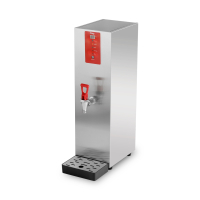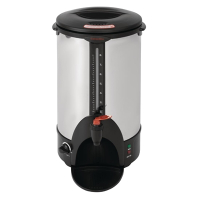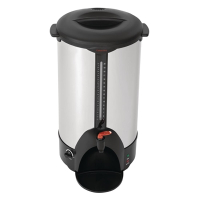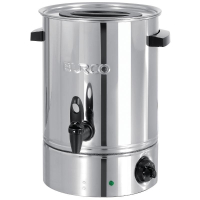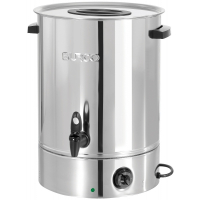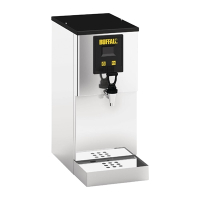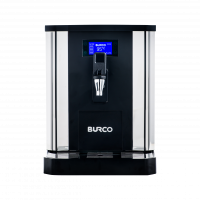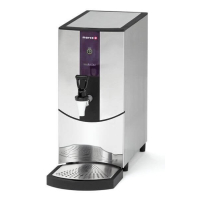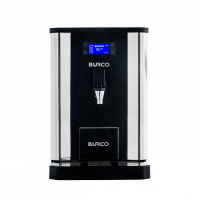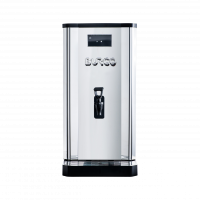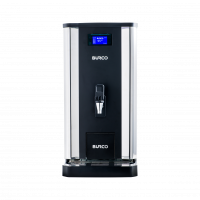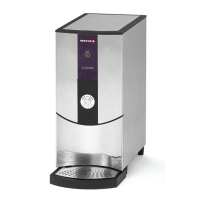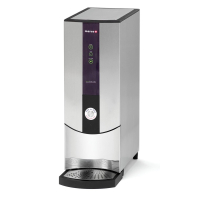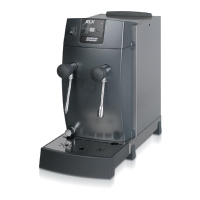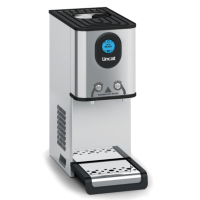Water Boilers
Commercial Water Boilers are essential kit for any UK café, restaurant, or hotel needing constant hot water on demand. With capacities ranging from compact 3L countertop models to impressive 40L wall-mounted units, they deliver piping hot water at precise temperatures—perfect for brewing the perfect cuppa or whipping up instant soups and sauces. These robust stainless steel workhorses feature auto-fill technology and temperature control systems that maintain water at the ideal 95-98°C, saving precious minutes during busy service. They pair brilliantly with coffee machines and food prep stations, completing your hot beverage setup while slashing waiting times and boosting customer satisfaction.
Explore More About Water Boilers
Get expert guidance, see real chef stories, and find answers to your most common questions.
-
Commercial Hot Water Boiler | Auto Fill Boiler | 10 Litre Capacity | Easy EB10
12 KGout of stock
630H x 190W x 240D mm
13 amp plug fitted
10 litres
Stainless Steel
£149.99 £455.00 -
Commercial Water Boiler | Hot Water Dispenser | 8L Capacity | Caterlite J709
3.61In Stock
430H x 300W x 300D mm
13 amp plug fitted
8Ltr
Stainless Steel
£81.89 £125.98 -
Commercial Water Boiler | Catering Urn | 20 Litre Manual Fill | Caterlite J722
6.5In Stock
560H x 0W mm
13 amp plug fitted
20Ltr
Stainless Steel
£93.59 £143.98 -
Commercial Water Boiler | Manual Fill Electric Urn | 10 Litre Capacity | Burco MFCT10STHF
3 KGIn Stock
380H x 300W x 335D mm
13 amp plug fitted
10 Litre
Stainless Steel
£142.99 £306.00 -
Commercial Water Boiler | 20 Litre Manual Fill Boiler | Electric Hot Water Dispenser | Burco MFCT20STHF
4 KGIn Stock
380H x 390W x 430D mm
13 amp plug fitted
20 Litre
Stainless Steel
£166.99 £357.00 -
Commercial Water Boiler | Manual Fill Electric Boiler | 30 Litre Capacity | Burco MFCT30STHF
4.4 KGIn Stock
480H x 390W x 440D mm
13 amp plug fitted
30 Litre
Stainless Steel
£184.99 £396.45 -
Commercial Countertop Water Boiler | Autofill Water Boiler | 10 Litre Capacity | Buffalo CN535
13.85In Stock
560H x 255W x 446D mm
13 amp plug fitted
10Ltr
Stainless Steel
£337.01 £654.02 -
Commercial Countertop Water Boiler | Autofill Hot Water Dispenser | 10 Litre Capacity | Burco AFU10CT
9.6 KGIn Stock
578H x 358W x 464D mm
13 amp plug fitted
10 Litre
Stainless Steel
£493.99 £1,058.49 -
🎯 Need Help Choosing the Right Water Boilers?
Discover how to choose the right model with expert advice on buying considerations, kitchen-tested usage tips, frequently asked questions and real-world chef insights below.
🎧 On the go? Listen to our expert podcast instead -
Commercial Water Boiler | Countertop Autofill Boiler | 5 Litre Capacity with Filtration | Burco AFF5CT
8.3 KGIn Stock
496H x 349W x 219D mm
13 amp plug fitted
5 Litre
Stainless Steel
£502.99 £1,077.00 -
Commercial Automatic Water Boiler | Eco Water Boiler | 5 Litre Capacity | Marco T5
10 KGIn Stock
465H x 210W x 515D mm
13 amp plug fitted
5 Litre
Stainless Steel
£521.99 £1,117.80 -
Commercial Water Boiler | Countertop Autofill Boiler | 10 Litre Capacity with Filtration | Burco AFF10CT
10 KGIn Stock
561H x 349W x 456D mm
13 amp plug fitted
10 Litre
Stainless Steel
£558.99 £1,197.00 -
Commercial Water Boiler | Countertop Autofill Boiler | 20 Litre Capacity | Burco AFU20CT
11.4 KGout of stock
696H x 344W x 454D mm
13 amp plug fitted
20 Litre
Stainless Steel
£560.99 £1,202.85 -
Commercial Water Boiler | Countertop Autofill Boiler | 20L Capacity with Filtration | Burco AFF20CT
11.7 KGout of stock
696H x 349W x 456D mm
13 amp plug fitted
20 Litre
Stainless Steel
£621.99 £1,332.00 -
Water Boiler | Wall Mounted Hot Water Dispenser | 5 Litre Ecoboiler | Marco WMT5
22kgIn Stock
448H x 325W x 223D mm
13 amp plug fitted
5 Litre
Stainless Steel and Plastic
£627.99 £1,346.40 -
Commercial Ecoboiler | Hot Water Dispenser | 5 Litre Push Button | Marco PB5
10 KGIn Stock
465H x 210W x 464D mm
13 amp plug fitted
5 Litre
Stainless Steel
£676.99 £1,450.80 -
Commercial Water Boiler | EcoBoiler | 10L Push Button | Marco PB10
12.5 KGIn Stock
590H x 210W x 464D mm
13 amp plug fitted
10 Litre
Stainless Steel
£734.99 £1,575.00 -
Commercial Water Boiler | Push Button Dispenser | 10 Litre Capacity | Marco PB10 EcoSmart
14.5 KGIn Stock
590H x 210W x 464D mm
13 amp plug fitted
10 Litre
Stainless Steel
£887.99 £1,902.60 -
Commercial Hot Water Boiler | Steam Boiler | 4L Capacity | Bravilor RLX4 E188
11.15kgIn Stock
448H x 245W x 509D mm
13 amp plug fitted
1.5Ltr
Black
£1,642.54 £2,526.98 -
Commercial Water Boiler and Chiller | Countertop FilterFlow System | Hot and Cold Water Dispenser | Lincat EB3FX/HC
24.8kgIn Stock
595H x 250W x 570D mm
13 amp plug fitted
7 litres
Stainless Steel
£1,874.99 £4,017.75
Commercial Water Boilers for Restaurants & Cafés
Brands Trusted by Industry Professionals
Key Features and Benefits
- Precise Temperature Control Set exact temperatures between 80-98°C—perfect for different tea varieties.
- Auto-Fill Technology Maintains water levels continuously—no waiting between serves.
- Rapid Heating Elements Delivers hot water in seconds—keeps queues moving smoothly.
- High Capacity Options Models from 3L to 40L—matches your venue's exact needs.
- Durable Stainless Steel Built tough for years of reliable service—resists corrosion.
- Energy Efficiency Features Insulated tanks and eco modes—slashes energy bills.
- Safety Taps & Controls Prevents accidental dispensing—protects staff from burns.
- Easy Maintenance Design Removable scale filters—simple descaling access for long life.
Too busy to read? Listen instead.
In this episode of The Deep Dive, discover how commercial water boilers keep cafés and kitchens humming—auto-fill tech, temperature precision, capacity options, and savvy integration with coffee stations to cut prep time and boost service.
14.53min | Expert-led | Real-world advice
0:00: OK, let's unpack this.
0:01: Picture this.
0:02: A really busy cafe, maybe that hotel breakfast rush, or a hectic restaurant kitchen here in the UK.
0:10: What's that one bit of kit that's just hammering away, absolutely essential, but you probably never give it a second glance.
0:16: Hm.
0:17: You might think of the coffee machine first, right, the flashy one, but actually based on the stuff we've been looking at these excerpts from a commercial catering equipment site.
0:26: The real sort of unsung hero, it might just be the commercial water boiler.
0:31: Exactly.
0:32: You know, we started thinking, OK, hot water box, but what came out of these sources was, well, something much more fundamental.
0:38: Definitely.
0:39: So our mission for this deep dive is to figure out why.
0:42: Why are these units, which seem pretty simple, described as Absolutely crucial in places like cafes, restaurants, hotels across the UK.
0:50: Yeah, going beyond just it makes hot water, right?
0:53: What's the real impact?
0:54: What makes a good one stand out?
0:55: We want to pull out those key bits of info the sources highlight.
0:58: And these aren't just beefed up kettles from your kitchen at home.
1:02: The sources and they mention having like Five decades of experience setting up kitchens, they described them as proper robust workhorses designed to deliver instant piping hot water.
1:14: Yeah, and reliably consistently at precise temperatures, and that consistency, that's huge, isn't it?
1:20: Because it's not just about a standard cuppa.
1:22: No, not at all.
1:23: For these busy places, consistent hot water is, well, it's non-negotiable.
1:27: Think specialty teas needing just the right temperature, instant soups, even some speed scratch cooking.
1:34: Eating hot water now instantly, and they play a big support role too, you know, while the fancy espresso machine is doing its thing with coffees and milk, a dedicated water boiler handles the sheer volume for teas, or maybe topping up Americanos, other hot water needs.
1:49: Right, so it frees up the main coffee machine, and crucially, you mentioned cues, massively reduces queues, especially during those peak rush hours.
1:57: It just keeps things flowing, which explains why for places churning out hundreds of hot drinks daily, The sources are really clear.
2:06: These aren't just nice extras.
2:07: No, they flat out say absolutely crucial, essential for service speed and keeping everything moving smoothly.
2:13: OK, so their role is vital.
2:16: Let's dig into what the sources say makes a quality unit tick.
2:19: What are those key features and benefits.
2:21: Right, this is where you really see the difference from, like a domestic appliance.
2:25: First thing that jumps out is temperature control.
2:28: The sources really hammer this home, being able to fine tune the heat.
2:32: We're talking anywhere from what, 70 degrees up to about 98 degree heat.
2:36: Exactly.
2:37: And that flexibility is vital.
2:39: Like you said before, different teas need different sleeping temps.
2:42: You might want it cooler for a green tea, hotter for a black tea, or instant coffee.
2:46: Precision matters.
2:48: Then there's just the sheer range of sizes.
2:50: Capacity.
2:51: The sources talk about everything from little compact 3 L countertop models tiny ones, yeah, for maybe very small spots all the way up to these massive 40 L systems you mount on the wall.
3:01: So whatever the size of the place or how many drinks they do, there's basically a boiler to fit.
3:06: They even give an example, don't they?
3:07: A 10 L model.
3:09: Yeah, working brilliantly, they say, for a small cafe, doing maybe 50 to 100 hot drinks a day.
3:15: It's about matching capacity to actual need.
3:19: And they're built tough, you know, proper food grade stainless steel designed to just take a beating constant use for years.
3:28: Some even have special bits, right, like a long life in collie element.
3:32: Yeah, that's a specific type of heating element.
3:34: It's made from this alloy that's really resistant to the heat and corrosion from boiling water constantly, built to last longer.
3:41: OK, makes sense, and speed.
3:43: It's not just how fast the water comes out, is it?
3:45: No, it's also about how fast it recovers.
3:47: The sources call it rapid recovery.
3:50: So after you draw off some water, how quickly does it heat the fresh stuff coming in?
3:54: Right?
3:54: It needs to be quick to keep up.
3:56: Within minutes, ideally, that keeps the hot water flowing even when it's really busy.
4:00: There's an expert mentioned, Henry Dalton, over 10 years' experience.
4:03: He really stresses that speed and reliability are the top things.
4:07: Recommends looking for that rapid recovery feature and efficiency too.
4:11: That's a big one.
4:12: Energy use.
4:13: They have insulated tanks, so once the water's hot, it stays hot using minimal power that directly hits the energy bills.
4:21: The sources say energy ratings matter and eco-models can save what, hundreds a year?
4:26: Potentially, yes, and advanced models are flagged as being up to 30% more energy efficient than older units.
4:32: 30%.
4:32: That's pretty significant over the lifetime of the machine.
4:35: It really adds up.
4:36: Now beyond heating, how you actually get the water out is important too.
4:41: The sources mention precise dispensing, portion control, things like that.
4:44: Yeah, helps cut down waste, ensures every drink is consistent.
4:48: You see things like dual function taps maybe hold for continuous flow or press for a set amount, simple push buttons too, or even those touch-free sensor taps.
4:57: With measured doses.
4:58: Exactly.
4:59: Good for hygiene, good for accuracy.
5:01: And the really fundamental difference from just using kettles is continuous operation, they're plumbed straight into the mains water supply.
5:08: So, always full, always ready.
5:11: Pretty much.
5:12: Continuous hot water for the whole service, no stopping to refill and wait.
5:17: That alone must be a huge time saver.
5:19: The sources also mention little practical things like drip trays.
5:23: Yeah, catches splashes, keeps the counter cleaner, and some higher-end models have self-diagnostics, they can flag up if something's starting to go wrong.
5:31: Smart.
5:32: OK, so, lots of features, different sizes.
5:35: Choosing the right one needs some thought about the actual place it's going into.
5:38: The sources cover that, right?
5:39: Types and buying points.
5:41: They do.
5:42: A basic choice is how it's melted.
5:44: Countertop is common, obviously sits on the work surface.
5:47: Takes up space though.
5:48: It does.
5:49: So wall mounted is popular, saves that precious counter space, but you know, needs proper fixing to the wall and undercounter units.
5:56: They exist too.
5:57: Yep, for a really clean look.
5:58: The main unit is hidden below, just the tap comes up through the counter and how they get their water autofill versus manual.
6:05: Key difference.
6:06: Autofill connects to the mains.
6:08: That's your truly automatic continuous supply.
6:11: Manual fill is more like a big urn, you have to top up by hand.
6:15: Less common now for high volume but still out there.
6:18: OK.
6:18: Now, something the sources seem really keen on is water filtration.
6:22: Oh, massively.
6:23: They strongly recommend getting a unit with built-in filtration or making sure it's compatible with an external filter system.
6:30: And why is that so important?
6:31: Couple of big reasons.
6:32: First, water quality.
6:34: Filtered water just tastes better, so your tea and coffee taste better.
6:37: Simple as that.
6:38: Makes sense.
6:39: Second, and this is huge, especially in hard water areas like, you know, a lot of the UK, it drastically cuts.
6:45: Down limescale buildup inside the boiler.
6:48: the enemy of hot water appliances.
6:50: Exactly.
6:51: Scale kills efficiency, affects taste, and shortens the lifespan of the unit.
6:55: So filtration protects your investment and keeps it running well.
6:58: They call it highly recommended.
7:00: Good point.
7:00: Any specific types of models mentioned for particular needs?
7:04: Yeah, a few examples.
7:05: Slimline models for tight spaces, they mention a Licat one with a tiny 250 millimeter footprint.
7:12: Useful if count space is really limited.
7:14: Narrow twin tap units for places that need really high volume, getting two drinks out at once.
7:21: And interestingly, specialized models with things like a PN code lock.
7:25: A PNN code.
7:26: Why?
7:27: For places needing extra security or control, think schools, maybe prisons, care homes.
7:33: Stop anyone just walking up and dispensing boiling water without the code.
7:36: Safety feature.
7:37: Wow, OK.
7:38: Didn't think of that.
7:39: And some units even do both hot and cold filtered water from the same tap, multifunctional, right?
7:45: So pulling all that together, if you're actually looking to buy one, what are the main things the sources say you absolutely need to consider?
7:51: OK, number one, capacity.
7:53: It really carefully to how busy you are, especially your absolute peak times.
7:57: Getting one that's too small, that's how you get cues.
7:59: Don't size it.
8:00: Got it.
8:00: Number 2, check the physical size, dimensions, but also any space needed around it for ventilation.
8:06: Make sure it actually fits where you want to put it.
8:08: Practical point number 3 power.
8:11: Understand what it needs electrically.
8:13: Most need their own dedicated circuit, maybe 13 amps for small ones, but up to 30 amps for the big fellas.
8:20: You have to check your wiring can handle it before you buy, especially if upgrading.
8:25: Crucial safety and installation point, often overlooked, I bet, very easily.
8:30: And finally, think about those running costs.
8:33: So check energy efficiency ratings and definitely consider that water filtration compatibility.
8:39: OK, solid advice.
8:40: We've talked features, impact, but how do they actually work inside?
8:45: The sources give a simple rundown.
8:46: Yeah, pretty straightforward in principle.
8:48: You've got an insulated tank, usually stainless steel.
8:51: That holds the water and heats it to whatever temperature you've set between 70 and 98 degrees.
8:56: When you press the button or pull the lever to get water, a measured amount comes out of the tank through the tap and at the same time.
9:03: At the exact same time, fresh cold water from the mains pipe flows into the tank to replace what you just took out.
9:09: , so it's constantly topping itself up.
9:11: Exactly.
9:12: And that incoming cold water immediately starts getting heated up.
9:16: There are thermostats inside constantly checking the water temperature in the tank, keeping it steady at your set point, and because it's always connected to the water supply.
9:24: You get that continuous flow of hot water for as long as you need it.
9:28: Sounds simple, maybe, but it's engineered to handle that nonstop demand.
9:31: Makes sense.
9:32: Now, you mentioned these things can last a long time, 7, 10 years even.
9:36: But the sources really stress maintenance for that, don't they?
9:40: Oh, absolutely critical.
9:41: They say proper maintenance is the key to getting that kind of lifespan out of a quality unit and the number one maintenance task.
9:48: Let me guess, descaling.
9:50: Bingo, especially in hard water areas, lime scale buildup is the big killer.
9:56: They recommend doing it monthly in hard water zones, maybe quarterly if your water is softer.
10:01: Using proper food safety scales, obviously, definitely.
10:04: It prevents that scale choking the.
10:06: Heating elements, keeps efficiency up, stops weird tastes, it's vital.
10:11: What else is on the regular checklist?
10:12: Just basic daily stuff.
10:14: Give the dispensing tap a wipe down, clean the drip tray, keep it hygienic, and maybe a quick weekly check that the temperature setting is still accurate.
10:22: Simple enough, and safety.
10:24: Dispensing near boiling water needs care.
10:27: The sources cover safety guidelines.
10:29: Yes, clearly laid out.
10:31: Regular checks may be monthly on things like seals and connections to make sure nothing's leaking, especially for wall-ed ones, need to be secured.
10:38: Crucial.
10:38: They're properly installed, yeah.
10:40: Also, having clear caution, hot water notices displayed seems obvious but important.
10:45: In training staff, essential, making sure everyone knows how to use it safely, avoids scalds, basic stuff that needs doing.
10:53: Then there's electrical safety keeping plugs and connections dry using RCD protection.
10:58: Those circuit breakers that cut the power fast if there's a fault.
11:00: Exactly, vital safety net.
11:02: And finally, they suggest considering using overnight shutdown modes or timers if the unit has them, saves energy, adds a layer of safety when the place is empty.
11:10: Right, OK.
11:11: So, putting it all together, the tough build, the continuous operation, the smart features, the essential maintenance.
11:18: What's the real tangible payoff for a business?
11:21: The sources really boil it down to three core benefits.
11:25: One, consistent quality, every cup, perfect temperature every time.
11:30: Huge for customer satisfaction, especially with tea.
11:33: 2, operational efficiency.
11:35: Being able to serve hundreds of drinks an hour without bottlenecks.
11:39: Speed keeps the queues down, keeps customers happy.
11:42: And 3, actual cost savings.
11:44: Compared to boiling kettle.
11:45: After kettle after kettle, these are generally more energy efficient in the long run, and they backed this up with some stats, don't they, some quite surprising ones.
11:52: Yeah, there's UK research mentions suggesting these boilers save cafes an average of 30 minutes a day.
11:58: Half an hour.
11:59: That's significant staff time saved.
12:01: It really is time they can spend serving customers or doing other jobs.
12:04: We already mentioned that 30% energy efficiency gain for newer models and that 710 year lifespan with proper care.
12:11: That's good value.
12:12: Definitely.
12:12: It's a long term investment.
12:14: They also touch on versatility again, useful for more than just drinks, cooked pot noodles, instant soups, that sort of thing.
12:21: The experts quoted seem to really rate them.
12:25: There was Mark, the specialist with 50 years' experience.
12:28: Yeah, he calls a good boiler the unsung hero of a busy cafe.
12:33: And really stresses how quality pays off, especially fighting limescale in hard water areas.
12:38: And that real world example, the Cardiff Cafe.
12:42: Great story.
12:42: They ditched 3 kettles, got 120 L automatic boiler result, a 40% jump in hot drink service speed during peak times.
12:50: Wow, 40%.
12:51: Yeah, plus they could finally get consistent results with their specialty.
12:55: and staff weren't stuck waiting for kettles.
12:57: They could focus on the customers.
12:58: They called it an absolute game changer.
13:01: That really brings it home.
13:02: And you hear from actual users too.
13:03: Yeah, comments like a tea room owner in Bath doing 300+ teas daily without breaking a sweat, or a hotel manager in Glasgow saying their new boiler slashed morning queue times.
13:14: Those direct quotes really show the difference.
13:16: Day to day.
13:17: Absolutely.
13:18: And it's not just the massive places.
13:20: The sources list who benefits most.
13:23: cafes, obviously, needing speed and volume, hotels, breakfast, to conferences, restaurants for drinks and prep, even office canteens dealing with those sharp break time rushes.
13:34: Right, so looking back at our deep dive, we started off thinking about, well, a pretty basic appliance, didn't we?
13:40: Just makes hot water.
13:41: Yeah, it seems straightforward.
13:43: But digging into the source material, what we've actually uncovered is a piece of really critical kit.
13:49: We've seen its vital role, the surprising amount of tech and features involved, how it actually works to keep that water flowing, the importance of looking after it, the maintenance, and the huge impact it has on how well a business runs efficiency, costs, consistency, customer flow.
14:05: It affects everything.
14:06: It really does make you appreciate there's a lot more going on than just, you know, heating water.
14:09: It's a serious piece of equipment, a strategic investment in how smoothly your operation runs.
14:14: Definitely.
14:15: It's about speed, reliability, energy use, long-term value, fitting the specific needs of a busy place.
14:22: That's quite calculated when you get down to it.
14:23: Absolutely, and it kind of leaves you with a thought, doesn't it?
14:27: We've seen how much this unsung hero delivers time savings, efficiency, consistency.
14:32: How many other bits of kit that seem totally mundane are actually doing similar heavy lifting, acting as these critical tools behind the scenes in places we go to every day.
14:42: Yeah, good question.
14:44: Is that simple promise of, say, instant hot water actually hiding this whole complex layer of operational planning and ultimately return on investment, makes you look at things a bit differently.

Essential Buying Considerations
Capacity and Placement
- Smaller cafés need 3-5L countertop models—perfect for limited space.
- Busy venues should opt for 10-20L wall-mounted units—frees up counter space.
- High-volume operations require 30-40L models—handles peak rushes effortlessly.
Power and Usage Requirements
- Check electrical requirements—most need dedicated 13A or 16A supply.
- Consider water connection needs—plumbed models need proper installation.
- Match hourly output with your busiest periods—pair with filter systems for best results.
How Commercial Water Boilers Work
These clever machines work on a surprisingly simple principle. Cold water enters through an inlet valve into an insulated tank, where powerful heating elements quickly bring it to the perfect temperature—typically 95-98°C. Most models feature auto-fill technology that maintains water levels as you dispense, eliminating waiting between uses. Temperature control systems constantly monitor and adjust heat to keep water at your precise setting, while insulated tanks minimize heat loss and improve energy efficiency. When you press the dispense button or lever, hot water flows through the tap at your chosen rate—ready for tea, coffee, cooking, or cleaning in seconds!

Trusted Insights from Henry Dalton
![]()
Beverage Equipment Expert
11 years experience
Safety Guidelines
- Regular Inspections Check water connections weekly—prevents leaks.
- Proper Training Ensure staff understand operation—prevents accidents.
- Clear Signage Mark dispensing area with caution signs—protects customers.
- Secure Installation Ensure wall units are properly mounted—prevents disasters.
- Isolation Switches Install accessible cut-off—essential for emergencies.
- PAT Testing Schedule annual electrical safety checks—stays compliant.
Top Tips for Using Commercial Water Boilers
To keep your water boiler performing brilliantly, establish a regular descaling schedule—monthly in hard water areas, quarterly elsewhere. Use manufacturer-approved descaling solutions rather than vinegar-based alternatives. Install a water filter system before your boiler to extend its life and reduce scale buildup. For maximum energy efficiency, consider switching to eco mode during quieter periods, and check the tank insulation regularly for any damage that might cause heat loss. Finally, train staff to report any temperature fluctuations immediately—often an early warning sign of heating element issues.
Benefits of Using Commercial Water Boilers
- Time Efficiency Instant hot water on demand—no kettles, no waiting.
- Customer Satisfaction Consistent temperatures—perfect drinks every time.
- Cost Reduction Lower energy use than multiple kettles—saves pounds daily.
Did You Know?
- Speed Quality commercial boilers dispense up to 30L per hour—perfect for rush periods.
- Durability A well-maintained unit lasts 7-10 years—excellent investment.
- Versatility Beyond tea, they're brilliant for instant noodles, soups, and hot towels.
- Savings Energy-efficient models use 25% less electricity than standard kettles.




Expert Insights on Commercial Water Boilers
After supplying these workhorses to thousands of UK venues over five decades, we've seen how transformative they can be. 'A decent boiler is mission-critical equipment,' explains Mark, our hot beverage specialist. 'The right unit drastically cuts serving times while ensuring consistent quality for every cup served—crucial for busy cafés.'
- Pros: Instant hot water, precise temperatures, labor-saving efficiency.
- Cons: Regular descaling needed in hard water areas—plan maintenance carefully.
Who Needs Commercial Water Boilers?
- Cafés Essential for tea service and food prep—keeps service flowing.
- Hotels Perfect for breakfast service and conference facilities—handles volume.
- Restaurants Speeds up hot beverage service and kitchen prep—improves efficiency.
- Service Stations Ideal for self-service hot drink areas—reliable 24/7 operation.
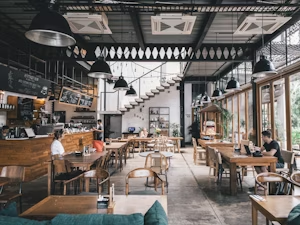
Real-World Success with Commercial Water Boilers
The Riverside Café in Bristol offers a perfect case study of how the right water boiler transforms operations. Previously using kettles, their staff were constantly playing catch-up during morning rushes. After installing a 10L wall-mounted boiler with temperature control, everything changed. 'It's been revolutionary,' says the owner. 'We've cut tea serving time by 70% and paired it with our filter coffee machines for a complete hot drinks station. Morning queue times are down, customer satisfaction is up, and we're selling more hot drinks than ever.'

FAQs
- How often should I descale my commercial water boiler? Monthly in hard water areas, quarterly elsewhere—keeps efficiency top-notch.
- What temperature is best for tea service? 95-98°C for black tea, 80-85°C for green tea—ensures perfect brewing.
- Can I install a water boiler myself? Plumbed models need professional installation—countertop units are plug-and-play.
- How much capacity do I need for my café? Calculate 250ml per tea serving during your busiest hour—then add 30% buffer.
- Are water filters necessary with boilers? Highly recommended—extends boiler life and improves beverage taste.
- What's the lifespan of a commercial water boiler? 7-10 years with proper maintenance—quality models justify the investment.
Looking for Equipment by Business Type?
Not sure where to start? Whether you're running a bustling café, opening a pizzeria, or managing a school canteen, we've made it easy to shop by business type. Explore handpicked equipment bundles and essentials tailored to your industry—saving you time and making sure you get exactly what you need.
Other Categories You Might Find Useful
We’ve selected some closely related categories that might be essential for your setup. Whether you’re expanding your kitchen or just making sure you’ve got everything covered, these links will help you explore more equipment that fits your needs.
What our Customers Say
'Our 20L boiler handles breakfast rushes without breaking a sweat—brilliant bit of kit!'
R Rachel Hotel Manager, Bath'Perfect temperature every time, massive time-saver for our busy tea service.'
J James Café Owner, Glasgow
Why Choose EasyEquipment for Commercial Water Boilers?
- Trusted Supplier 50 years supplying UK's best venues—unmatched experience.
- Fast Delivery Next-day options throughout Britain—gets you up and running.
- Best Price Promise We'll match any like-for-like quote—ensures value.
- Expert Support Dedicated help pre and post-purchase—always available.
Ready to Explore Commercial Water Boilers?
Browse our complete range of commercial water boilers to find the perfect model for your café, restaurant, or hotel. With options for every space and service level, plus our unbeatable support and warranty, your hot water solution is just a click away.
#CommercialWaterBoiler
- #CafeEquipment
- #HotWaterDispenser
- #UKCatering
- #TeaService
- #RestaurantKit
- #EasyEquipment

